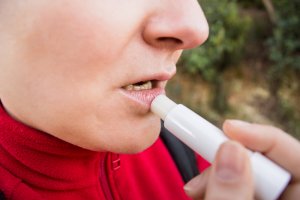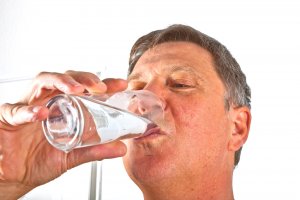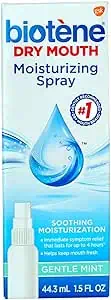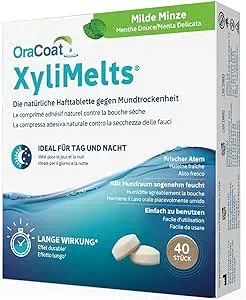When your mouth doesn't produce enough saliva, this is called dry mouth, or xerostomia. It can range from being a mild inconvenience that happens occasionally, to something that can cause serious dental problems.
If you get a dry mouth and lips often then it could be a sign of deeper medical issues. In this article we're going to cover:
- What dry mouth is
- The symptoms you might experience
- Different things that cause dry mouth
- How it can affect your dental health
- What treatments are available
We'll also answer some common questions that you might have about the problem.
Although not particularly pleasant, dry mouth isn't something that should cause you to worry. It's worth understanding what might be causing the problem for you, then you can check what treatments or remedies might help. Here we'll go through everything you need to know about dry mouth to help you get a better understanding of the issue.
In This Article
What is dry mouth?
Put simply, dry mouth occurs when your salivary glands aren't making enough saliva to keep your mouth comfortable. Your saliva plays a really important role in your mouth. Without you noticing it, your saliva:

- Helps prevent tooth decay by neutralising acids in the foods that you eat
- Limits the bacteria in your mouth which can lead to bad breath, or halitosis
- Washes away bits of food as it swills around your mouth, keeping things clean
- Improves your ability to taste by moving food and drink over your whole tongue
- Aids your digestion by making food in your mouth moist and easier to swallow
Most people have probably experienced dry mouth, even if just for a short time. Your mouth might feel like there is cotton inside, that's why it's sometimes called “cottonmouth”. The saliva in your mouth might also feel stringy and you can get dry and cracked lips.
Dry mouth causes
There's quite a range of things that can cause dry mouth. Some are very easy for you to fix and others might need the involvement of your doctor. There are various treatments and remedies that can help with the dry mouth symptoms you're experiencing, but first you'll need to know what's causing the problem.
A lot of people find that their dry mouth is caused by medicines that they take. If you start taking a new medicine and then your mouth is suddenly dry, you can check the information leaflet to see if it's a common side effect. There are lots of medications that can cause dry mouth, including:

- Medication to treat high blood pressure
- Tablets that treat anxiety
- Some treatments for Parkinson's
- Antihistamines
- Decongestants
- Muscle relaxants
- Over-the-counter pain medication
Make sure that you tell your doctor about any medication that you're taking if you're worried about dry mouth. They may be able to adjust your dosage or how you take it if it causes you a lot of trouble.
Some health conditions are also associated with reduced saliva production. These include:
- Diabetes
- Rheumatoid arthritis
- Oral thrush
- Sjögren's syndrome
- Cystic fibrosis
- HIV/AIDS
Snoring and mouth breathing may also make your mouth dry, and these can be caused by a few different medical conditions. If you've had an injury to your head and neck there's a chance of nerve damage that reduces the amount of saliva you produce, too.
Finally, there are lifestyle factors that can give you a dry mouth. When you aren't drinking enough water you can get dehydrated, and this inevitably makes your mouth dry. Drinking alcohol and smoking cigarettes or vaping can also make your mouth dry temporarily, along with caffeine. Other drugs that are associated with getting a dry mouth are cannabis and methamphetamine, or crystal meth.
Older people with dry mouth

Xerostomia does tend to occur in older people, however it's not an inevitable fact of ageing. The correlation is thought to stem from the fact that the elderly tend to take more prescription medicines which can cause dry mouth, as well as being more likely to have associated long-term health problems.
The chances of suffering from Sjögren's syndrome also increase with age. Around 90% of people diagnosed are women with an average age of 50; it's associated with menopause. The syndrome affects fluid-producing parts of the body and its most noticeable symptoms are a very dry mouth and eyes.
This video has lots of useful information about Sjögren's syndrome, including other symptoms to look out for:
Thyroid disease can cause dry mouth
It's estimated that around half of people with xerostomia could have thyroid disease. Hypothyroidism is associated with a slow metabolism, and doctors believe that this could be what leads to slower production of saliva in patients with this condition.
Dry mouth and radiotherapy
As part of cancer treatment, you may have to undergo chemotherapy or radiotherapy. These can cause your mouth to get dry but the problem usually subsides after your treatment has finished.
During chemotherapy, the treatment that you receive is likely to change the composition and rate of production of your saliva. It's likely the last thing you want to experience when going through cancer treatment, but your mouth should return to normal once your course of treatment is complete.
When receiving radiotherapy treatment around your head and neck area, you will also likely notice your saliva production reduces, but again this should also go back to normal after treatment. It is possible that you might start to suffer from xerostomia up to one year after your cancer treatment, and in this case the damage done to your saliva glands might be irreversible. There are plenty of ways to alleviate dry mouth, which we'll go through a little further down.
Dry mouth symptoms
The most common dry mouth symptom is a reduction in the amount of saliva in your mouth. This in itself might not be immediately noticeable, but there are lots of indicators that you will probably become aware of.
Dry mouth can result in one, some, or all of these symptoms:

- A feeling of dryness or stickiness in your mouth
- Saliva that feels thick or stringy
- Bad breath, or halitosis
- Difficulty speaking, chewing, and swallowing
- A dry throat that's sore and hoarse
- Grooves or cracks in the surface of your tongue
- Food tasting different to normal
- Problems with your dentures staying in place
- Lipstick sticking to your teeth, if you wear it
- Your mouth looking red, shiny, and sore
- Teeth looking transparent
Although not really a symptom of dry mouth, you might feel the urge to drink more water than normal too. Doing this might even be enough to cure your dry mouth, if it's caused by simple dehydration.
Risks to your dental health
Because your saliva is an important part of your dental health, when you are producing less of it your teeth and gums can suffer. As we've mentioned, saliva neutralises acids from the food you eat and sweeps away food debris after you've eaten, preventing the build up of dental plaque and tartar and reducing chances of cavities and decay.
If you have constant dry mouth, you will need to make sure you pay more attention to your oral health. Speak to your doctor or dentist if you have concerns about your teeth relating to your xerostomia. You'll likely be advised to visit your dentist at least twice a year – possibly more.

You can also help protect your teeth by using a toothpaste which is high in fluoride and free from SLSs. SLS, or sodium laurel sulphate, might make any irritation in your mouth worse. Sensodyne Sensitive Toothpaste doesn't contain SLS and has a high fluoride content of 1450ppm, making it a good toothpaste for dry mouth sufferers.
When necessary, your dentist might also give you fluoride trays to put over your teeth at night. Adding extra fluoride into your routine will help keep your teeth strong and counteract some of the negative effects that come along with dry mouth. These tips for remineralizing teeth might also come in handy.
What dry mouth treatments are available?
You can go down the route of pharmacy-bought medicines, and there are also some home remedies for dry mouth that you might help to relieve your symptoms. If you suspect that it's one of your prescription medications causing your dry mouth, talk to your doctor. They may be able to adjust your dosage, change your medicine, or give you the medicine in a different form to relieve your symptoms.
If that doesn't help, or your dry mouth is caused by something else, you can try some other treatments. Your doctor might recommend medication such as Pilocarpine, which stimulates saliva production. This will probably be prescribed if you have Sjögren's syndrome or permanent problems after radiotherapy.
Dry mouth spray and mouthwash

One key thing when looking at sprays and mouthwash for dry mouth is to avoid any that contain alcohol; they'll make your mouth drier. There are products on the market that can help relieve your dry mouth, such as Biotene Mouth Spray. This works by moisturising the inside of your mouth with humectants and lubricants.
One Amazon reviewer describes how they kept waking up with dry mouth due to a medicine they take and “when I tried to speak to my husband, he can't understand what I'm saying! Now, if I keep the Biotene handy on my bedside table, I can quickly put a bit on my tongue and I'm able to speak!”
Biotene also have a moisturising mouthwash that works in a similar way to their dry mouth spray. You can use it up to five times a day to relieve the symptoms you experience, and as well as being alcohol free, it contains xylitol which is important to stimulate your mouth to make more saliva.
Xylitol and dry mouth
A common and much recommended dry mouth treatment is to use products that contain xylitol. This is a sugar replacement that is known to increase saliva production, while also protecting teeth from decay. It's usually found in sugar-free chewing gum, such as the natural xylitol in this Peppersmith's chewing gum. Gum itself is known to increase the amount of saliva that you produce, so it's a good idea all round.

If you're not a fan of chewing gum, or can't use it because you wear dentures or braces, OraCoat XyliMelts are another option that you can try. They are sugar-free and release xylitol as well as humectants and lubricants to make your mouth moist. One Amazon reviewer enthusiastically says, “Brought these under recommendation. Having survived throat cancer treatment, I've lost my saliva. Only used this for last 2 nights but have 2 of the best nights’ sleep in a year. No waking every hour for sips of water. Highly recommend”.
Here's a run-down of the treatments that you can buy in a pharmacy or shop that can help relieve your symptoms:
[wptb id="29771" not found ]Relieving cracked lips
As well as affecting your mouth, xerostomia can make your lips cracked and sore. Along with using the other treatments available, you can use a moisturising lip balm to keep them soft and less likely to crack. A popular choice is Burt's Bees natural Beeswax lip balm, which is long-lasting, comes in a range of flavours, and is available in a stick or a tin.
Natural and home remedies for dry mouth
If you suffer from dry mouth, there are lots of other things that you can build into your daily routine to relieve the discomfort. Some things you can try include:
- Take steps to reduce or stop snoring: Snoring can give you a dry mouth in the morning. If you can find a cure for your snoring, this should relieve your morning cottonmouth.
- Try mouth taping: It may sound weird, but taping your mouth shut at night or using another device to stop you breathing through your mouth can help a lot.
- Put a humidifier in your bedroom: A major cause of dry mouth at night, and general dehydration, can be a dry atmosphere in your bedroom. Adding a humidifier could relieve symptoms.
- Suck on ice chips: Throughout the day you can keep your mouth moist by sucking on ice so there is always water in your mouth. It will also keep you hydrated since you're swallowing extra water.
- Increase your water intake: If you think your dry mouth is caused by dehydration, you can monitor your water intake. Doctors recommend drinking around 2 litres per day.
- Change your diet: Eating salty and sugary foods can make your mouth dry and dehydrate you, so try to reduce your intake. Avoiding drinks with caffeine and cutting out alcohol and tobacco should also help.
When the mouth isn’t producing enough saliva, it can make things uncomfortable. Dry mouth makes you feel like your tongue is sticking to everything it touches, you can’t talk or eat normally, and your lips can be chapped and begin to crack. If you’re struggling from dry mouth, try these at-home remedies:
- Limit caffeine intake
- Switch to a mouthwash made for dry mouth
- Increase saliva production by chewing sugar-free gum
- Review the medications you’re currently taking with your doctor, like allergy medicine, that can cause dry mouth
If your dry mouth lasts longer than a few days and makes it uncomfortable to talk or eat, make an appointment to see your dentist.
Dr. Ania Mohelicki
Conclusion
We have established that the causes of dry mouth are numerous, as are the symptoms which can affect your day-to-day life. If you're experiencing discomfort from a dry mouth at night or have constant dry mouth, you may find some relief from store-bought treatments and even some simple lifestyle changes like drinking more water.
However, dry mouth can be a result of underlying medical conditions or a reaction to certain medicines so if the problem persists you should consult your doctor. They should be able to help you get the symptoms under control.
Either way, it's important to address your xerostomia so that it doesn't start to have a negative affect on your overall oral health.
FAQs
I have constant dry mouth, should I be worried?
When your mouth is constantly dry it could be an underlying symptom of bigger issues. If you're concerned you should seek medical advice; there may be medications that could help you.
Why do I get dry mouth at night?
There are lots of causes for dry mouth at night, including snoring, side effects from any medication that you take, or just your bedroom having a dry atmosphere.
Check the side effects of your medicines with your doctor and if they aren't the cause, you can make sure you're drinking enough water throughout the day and consider putting a humidifier in your bedroom.




